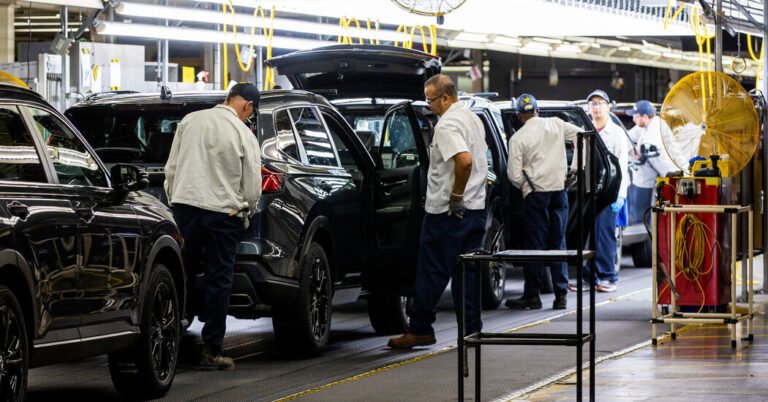
In a significant escalation of trade tensions between Western countries and China, Prime Minister Justin Trudeau said on Monday that Canada would impose 100 percent tariffs on Chinese electric vehicles, joining the United States and the European Union in protecting domestic car production.
The move aligns Canada’s automotive policy with that of the United States, the market for the vast majority of Canadian-made vehicles where President Biden in May announced 100 percent tariffs on Chinese electric cars. And it also appears to be a form of insurance for the tens of billions of dollars in subsidies that Canadian governments have committed for the development of electric vehicle and battery factories being built in the country by Honda, Stellantis, Volkswagen, General Motors, LG and others.
In addition, Canada will also impose a new 25 percent tariff on Chinese steel and aluminum. The tariffs will most likely worsen the country’s rocky relations with China and could raise the possibility of retaliation by the Chinese government against Canadian agricultural exports.
“I think we all know that China is not playing by the same rules,” Mr. Trudeau told reporters on Monday in Halifax, Nova Scotia. “What is important about this is we’re doing it in alignment and in parallel with other economies around the world.”
Canada opened public consultations on the tariffs at the beginning of July. The 100 percent tariff on Chinese electric vehicles will go into effect on Oct. 1.
The new U.S. tariffs are expected to begin by the end of August. And the European Union has said that, at the end of October, it would impose additional tariffs of 9 percent to 36.3 percent on Chinese electric cars, depending on the manufacturer, beyond the standard 10 percent tariff it already levies on imported vehicles.
Twenty-five percent of federal subsidies for consumers to buy electric vehicles covered imports from China in 2023, according to government documents obtained by Automotive News Canada, an industry publication. A year earlier, just 2 percent of the subsidies went to Chinese-made cars, the government analysis said. Most of the Chinese-made vehicles being subsidized were Teslas produced in Shanghai.
The only zero-emission vehicle currently made in Canada is a General Motors delivery van.
Automotive manufacturing companies and Unifor, the union that represents auto workers in Canada, have been pushing Mr. Trudeau’s government to match the U.S. tariffs on Chinese electric cars and trucks. Those calls grew louder after a lobbying firm working for BYD, a leading Chinese electric vehicle maker, filed notice that it was working to sell passenger cars in Canada.
BYD, which has been expanding around the world, currently only sells electric buses in Canada and the United States. The company has been selling imported electric and hybrid cars in Mexico and other Latin American countries.
Some environmentalists as well as the Green Party of Canada, a relatively small group, cautioned against high tariffs on Chinese-made electric vehicles and urged the government to explore other ways to keep the Canadian manufacturers competitive. They argued that tariffs will slow the adoption of zero-emission vehicles by keeping prices relatively high.
Mr. Trudeau came to office in 2015 promising to renew relations with China, which had soured under a previous Conservative government. Instead, they sank to a new low in 2018 after the Royal Canadian Mounted Police arrested Meng Wanzhou, a senior executive at the Chinese technology company Huawei, on an extradition request from the United States.
In what Canada characterized as hostage-taking, China then arrested two Canadians. Ms. Meng and the two Canadians were ultimately allowed to return to their home countries in 2021.
China also temporarily blocked imports of canola, an oil seed, from Canada. While the step was ostensibly taken because of insects in the grain, Canada viewed it as further retaliation.
Melissa Eddy and Ana Swanson contributed reporting.